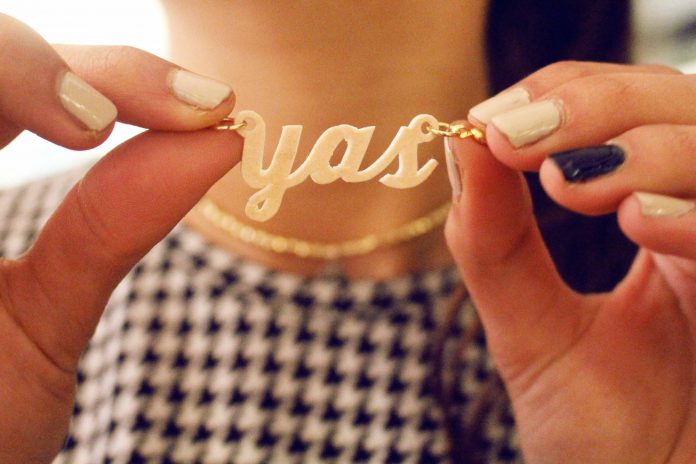We’ve heard them all. “Your brows are on fleek, girl.” Or, “Bye Felicia.” Or, “Let’s get turnt tonight” [insert martini emoji, followed by the wine glass emoji, probably followed by the beer emojis]. These are terms that we use in our daily lives when it comes to texting, tweeting, snapchatting, and more. What’s funny, is back in the AOL Instant messaging day, we relied on similar abbreviations like “LOL”= laughing out loud, and “ROTFL”= rolling on the floor laughing, and “G2g”= got to go. But here’s the thing: those were actually decipherable. Today, an entirely new language has developed when it comes to shorthand text, and it can only be described as some type of social media metaphor (I can nearly feel the quake of the earth as Shakespeare rolls in his grave about this).
But there are so many questions when it comes to this new cipher: Where the hell did these terms come from? Who is Felicia? Why did babe drop its second b? Why did yes drop the e and add an a?
Luckily, we at the Lala HQ did a little digging, and found the derivations of these very fascinating internet terms.
On Fleek
So, guess what? The earliest definition of “On Fleek” was published on Urban Dictionary back in 2003, People magazine reported last year. That’s right, this term has actually been around for twelve, yep you read that right, twelve years. People reports that the term was defined as “smooth, nice, sweet.” Later in 2009, “awesome” was added to its definition. “On Fleek” was revived by Viner Peaches Monroe, who coined the term “eyebrows on fleek” in June 2014. It skyrocketed from there, as celebrities and brands eventually picked up on the words.
Bye Felicia
I know what you’re thinking. So who is this Felicia that we’re always talking about? Well, we’re happy to report that at least she’s an actual person, or character, if you will! The line is actually from a movie, starring Ice Cube, called Friday. Ice Cube’s character is, for lack of a better word, shooing away a character named Felisha off his doorstep. Hence he says, “Bye Felicia.” Ice Cube confirmed on Conan that “Bye Felicia” is pretty much equivalent to, “get out of my face!” #sorrynotsorry Felicia.
Turnt Up
We can thank Lupe Fiasco for this one. In his 2009 Enemy of the State album, he released a song called “Turnt Up.” The term has since been correlated with extreme partying (we’re talking, the inclusion of pretty dangerous substances here), and has made it into lyrics of singers Miley Cyrus and Nicki Minaj alike. “Turnt”‘s definition has recently begun to shed it’s negative connotation, and now can be used as a term to describe excitement. Thank you Lupe for the slang, but we’re sticking with the latter definition on this one, not the former.
Yas Queen
If you’re thinking Broad City for this one, you’re pretty much almost right. Bustle, however, reported that the term “Yaaaaass” was coined by a Lady Gaga fan on Instagram, user @Johnnyversayce who uttered this word in excitement when he got to meet her. We don’t blame him, meeting Lady G in the flesh, we would probably forget the “eh” sound in our yes too.
#Sorry Not Sorry
#Sorrynotsorry’s history is a bit murkier than the others. Some attribute its origin to a song released in 1994, called “Sorry, Not Sorry” by alternative metal band, AMEN. Others just say its popularity began in 2011 on Twitter, when users wanted to tweet sassy “apologies.” Either way we’re kind of happy it exists no matter what. #Sorrynotsorry. Pun Intended.
Bae
Now, this word perhaps has the coolest history. According to The Atlantic, the term “bae” goes back to 2005, and can be traced back to “African-American English” in hip-hop and R&B songs. Thanks to Miley Cyrus and Pharrell, “Come Get It Bae” brought back the word in full force. Oxford’s blog defines it as a “term of endearment for one’s romantic partner,” and guess what? “bae” was a runner-up for the Oxford Dictionaries Word of the Year in 2014.
—
BONUS : Swag
This one is a bit of a throwback, but one of our all-time favorites. Short for “swagger,” we can trace “swag” all the way back to Sir William Shakespeare himself. “Swagger” refers to “strut in a defiant manner,” according to the Online Etymology Dictionary, and “swag,” means to “boast or brag.” The earliest recorded usage of “swagger,” was, believe it or not, used in three of Shakespeare’s plays, “Midsummer Night’s Dream,” “Henry IV Part Two,” and “King Lear.” See, people even had #swag back in the 1520s! Hearing that we still use this term actively, Shakespeare would most certainly stop rolling in his grave… we hope…

